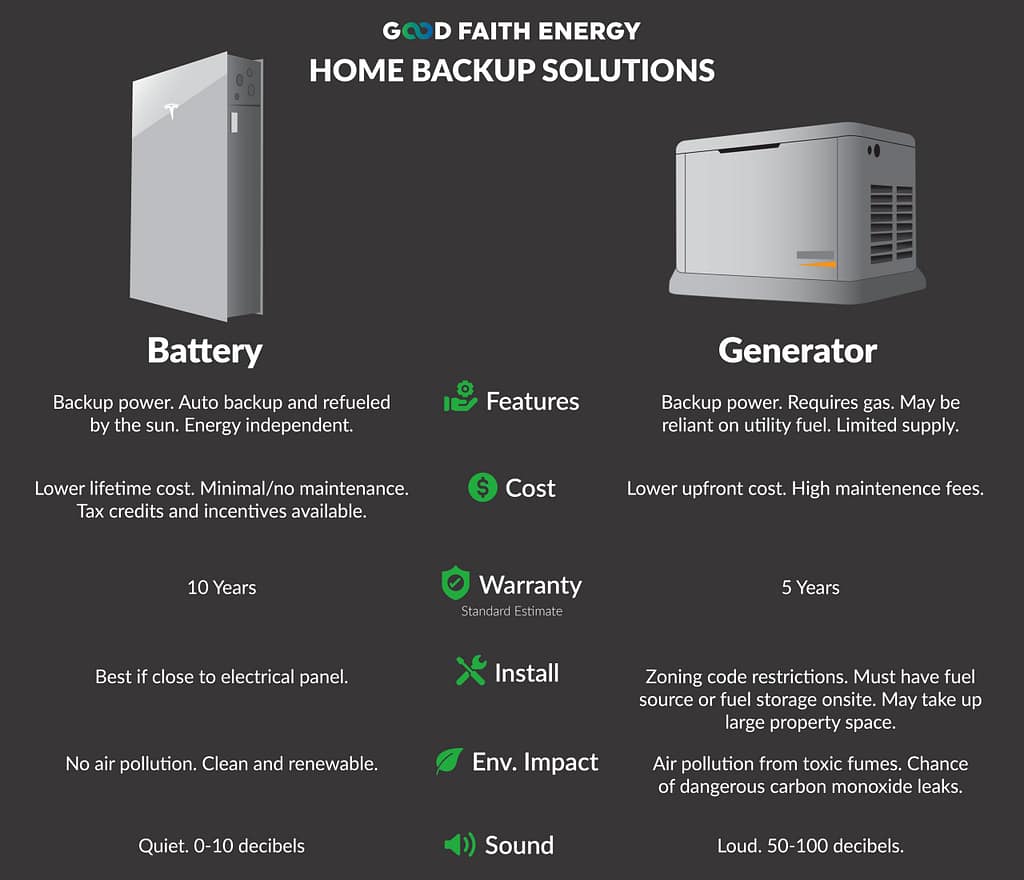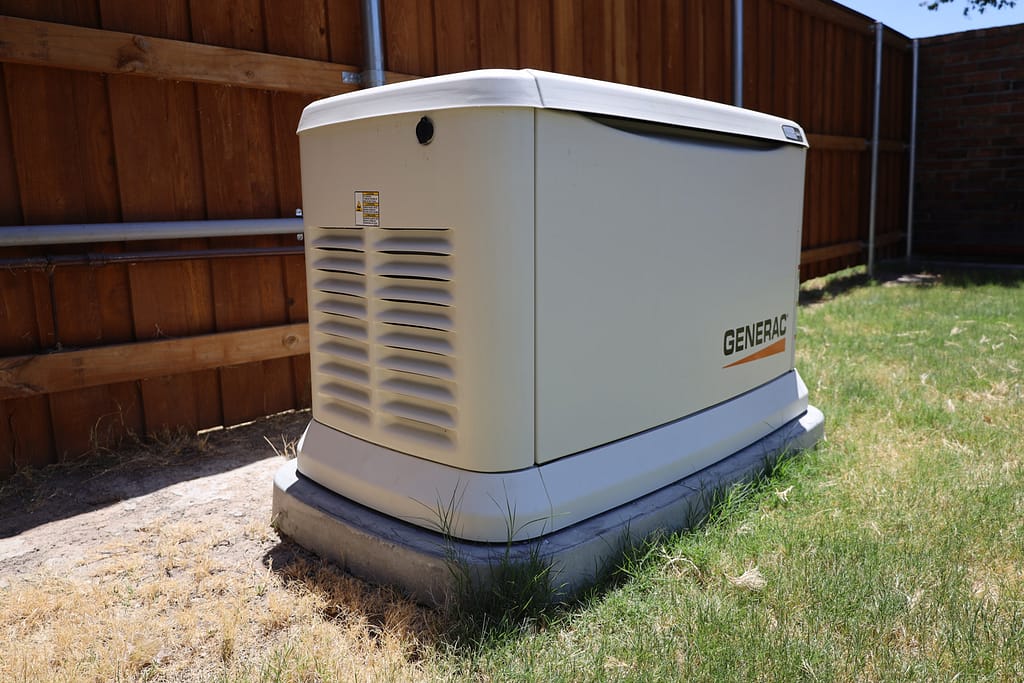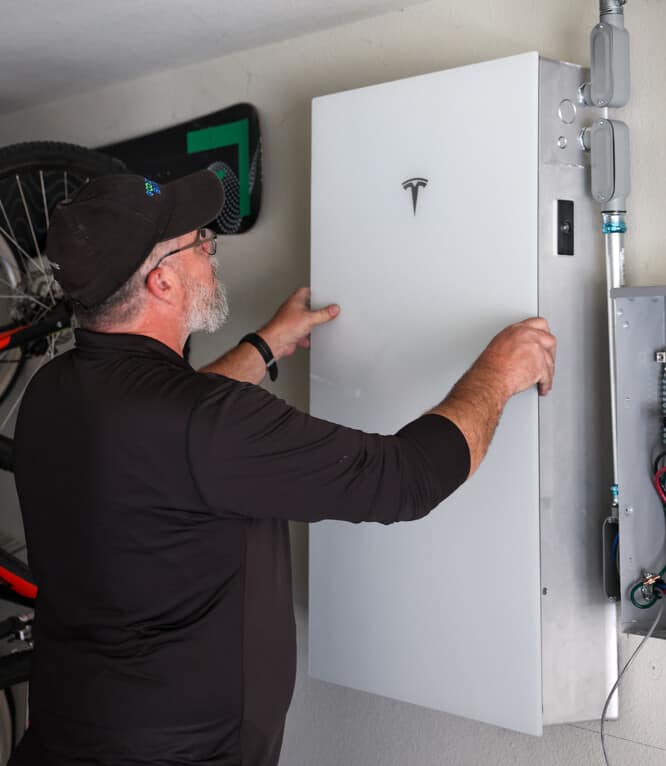While both home batteries and generators serve the purpose of keeping the lights on when the grid goes down, there are significant differences to consider in terms of functionality, convenience, and long-term benefits when considering backup power solutions for your home.

Generators have long been the traditional choice for home backup power. They are known for their reliability but they come with certain drawbacks. However, battery backups offer a modern alternative that addresses these limitations. Explore the comparative analysis between generators and home batteries for backup power solutions below, highlighting key factors such as noise levels, costs, features, installation, and environmental impact.
Noise
Generators can be noisy, disrupting conversations and creating a less-than-ideal environment. The noise levels can range from 50-100 decibels which is the equivalent to the sound of moderate rain to as loud as a helicopter. Home batteries present a modern and innovative alternative. They are extremely quiet and compact with noise levels ranging from 0-10 decibels which as most, you would only hear the light whirring of a small fan if the battery gets warm.

Cost
Although generators provide lower upfront costs, they require high maintenance. Maintenance plans can cost upwards of $5,000. On the other hand, battery backups offer a competitive lower lifetime cost. Although their upfront costs are higher, they have minimal to no maintenance costs. Additionally, battery backups have a higher product warranty of 10 years (this is a standard estimate) compared to a generator’s product warranty of 5 years (this is a standard estimate) providing peace of mind to homeowners.
A critical cost reduction for batteries is in the numerous federal tax credits and incentives available. Generators do not qualify for any federal tax credits, unlike solar-powered home batteries, which offers a clear advantage in terms of cost savings and environmental benefits. These factors contribute to the overall lower lifetime cost of battery backups as opposed to generators.
One of the standout features of home batteries is their ability to participate in grid services, enabling homeowners to sell back excess energy to the grid or contribute to virtual power plants. Not only can you make money by selling your excess energy to the grid, but it also helps alleviate strain on the grid, especially during peak demand periods.
Features
Both generators and batteries provide home backup power. However, there are differences in the other available features for these two products.
In terms of performance during outages, home batteries seamlessly kick in to keep essential appliances running without any noticeable interruptions. Their automatic operation provides a hassle-free experience, akin to having a reliable guardian angel watching over your home’s power supply. However, generators have a 7-10 second delayed transition which may severely impact you if you have any medical devices that need to remain powered at all times.
Additionally, battery backups have a smart feature called Storm watch. Storm watch technology further enhances the reliability of home batteries by preparing for unpredictable weather events, ensuring uninterrupted power supply when it’s needed most. This level of predictability and transparency sets home batteries apart as a dependable backup power solution.
Both products allow the user to energy manage to prioritize the critical appliances they need to keep powered.
Energy independence is where the battery backup shines. Batteries allow you to be completely independent from the grid. Conversely, generators may be reliant on utility fuel and are subject to fuel outages such as during Storm Uri in 2021.

Installation & Environmental Impact
Generators require both electrical and plumbing work. In addition to that, they need a fuel source or the storage of fuel on site on your property which can take up valuable property space. On the contrary, battery backups are fueled by harnessing the power of the sun through solar panels, so no fuel-storage is necessary. Generators also need a 12 volt battery such as a car battery to start working which is a major downside. They may also have zoning code restrictions, require zoning, and (sometimes) neighbor approval.
Since generators are fossil fuel based, they emit harmful air pollution from toxic fumes. This leads to the chance of carbon monoxide leaks which can be deadly.
Which Option is Better for You?
In deciding between generators and home batteries for backup power solutions, several factors come into play. Generators, long favored for their reliability during power outages, offer immediate functionality but often come with drawbacks such as noise pollution, high maintenance costs, and environmental concerns due to fossil fuel usage. Additionally, their reliance on fuel storage and zoning restrictions may pose logistical challenges for homeowners.
On the other hand, home batteries present a modern alternative with distinct advantages. They operate quietly, have lower lifetime costs, and are eligible for federal tax credits, offering both economic savings and environmental benefits. With features like seamless performance during outages, smart technologies such as Storm watch, and the ability to participate in grid services, batteries offer a reliable and hassle-free backup power solution. Moreover, their energy independence and reliance on solar power align with sustainability goals, making them an attractive option for homeowners seeking a more eco-friendly alternative to traditional generators.
In conclusion, when considering backup power solutions, the choice between generators and solar batteries ultimately boils down to reliability, eco-friendliness, cost-effectiveness, and ease of use. With home batteries offering a compelling package of benefits, including sustainability, savings, and convenience, they emerge as the preferred option for modern homeowners. If you’re looking to beat the Texas summer heat and safeguard your home with a reliable backup power solution, contact a reputable solar installer like Good Faith Energy for a free quote. And don’t forget to explore our video content to learn more about the latest innovations, including the Tesla Powerwall 3.
Fact checked by Jacob Petrosky – 5/1/2024